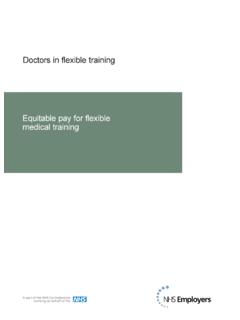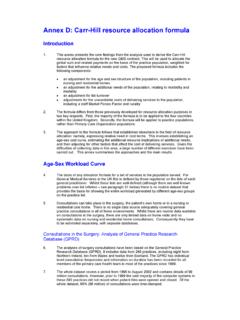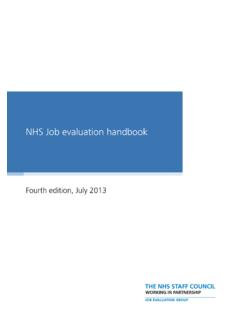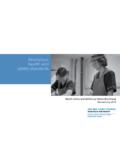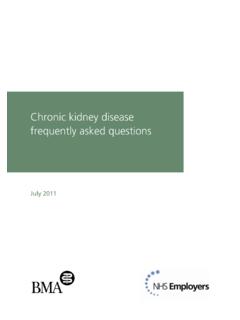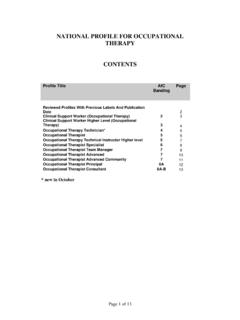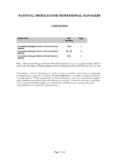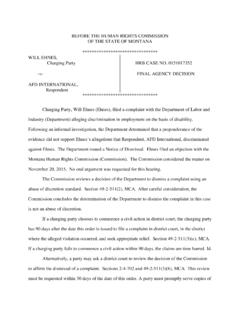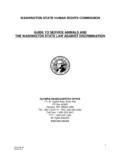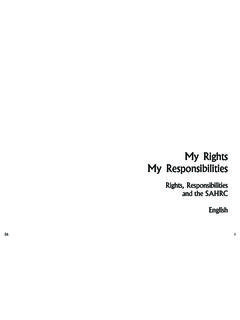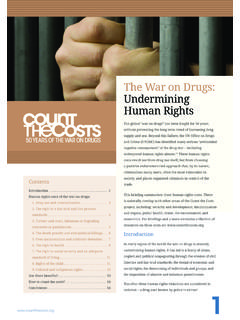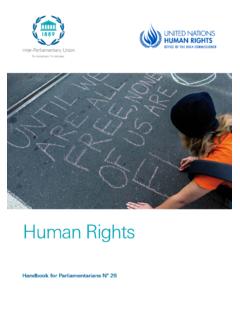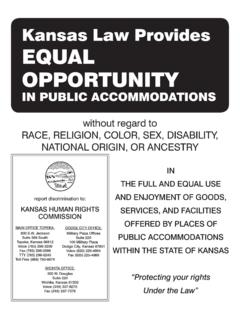Transcription of Human rights and human resources in the NHS: …
1 January 2010 Briefing 69 Human rights and Human resources in the NHS: implications for the workplaceThe NHS Constitution, which came into law as part of the Health Act in November 2009, makes it clear that healthcare and Human rights go hand in hand. Human rights legislation presents various workplace implications for employers and these are being enforced through the courts in cases like Kulkarni v Milton Keynes Hospital NHS Foundation Trust (2009). The Court of Appeal ruled that NHS doctors and dentists were entitled to legal representation if facing charges, which if proven, could prevent them from practising. Cases like this are bringing a sharper focus to Human rights issues for the Briefing outlines a Human rights approach to managing workplace practices, which can not only keep organisations operating within the law, but can help further the reputation of the NHS as a model employer.
2 It shows some of the ways the Human rights Act could be used to challenge Human resource decisions, and provides a useful decision making tool to ensure pointsThe NHS Constitution and the Human rights Act 1998 have enshrined Human rights into NHS practice and UK employers must assess their policies, procedures and decision making in terms of Human values embodied in Human rights legislation (FREDA principles) mean that service users, carers and staff can expect to be treated with fairness, respect, equality, dignity and FREDA principles provide a useful framework for employers to create a positive culture of inclusion, value and culture can foster improved working relationships and contribute to productivity and business NHS Constitution outlines clear aspirations for Human rights , which include a comprehensive service for all and equal access, dignity and respect for patients and staff.
3 Similarly, the Darzi report, High quality care for all focuses on ensuring that patients receive personalised care and are treated with compassion, dignity and respect . Both clearly support the Human rights principles of fairness, respect, equality, dignity and autonomy (FREDA principles).2 Briefing 69: January 2010 Human rights and Human resources in the NHS: implications for the workplaceThe Department of Health document Human rights in healthcare: A framework for local action (2008), aims to show how these values can be applied in practice and how a Human rights based approach can be of value to NHS organisations. The values embodied within Human rights need to become part of the ethos and culture of the public sector.
4 Even organisations that operate within the boundaries of the law can still be challenged about practices which are contrary to Human rights values. This makes it essential for NHS organisations to understand the implications of Human rights legislation in service delivery, the treatment of patients and in their role as employers. Inspectorates such as the Audit Commission, Equality and Human rights Commission and the Care Quality Commission continue to play a critical role in monitoring Human rights policy and the Human rights Act 1998 The Human rights Act (HRA) comprises a number of articles describing the fundamental legal rights of UK citizens.
5 These rights are not equal in status and fall into three categories:Absolute rights : these cannot be withdrawn or made subject to conditions. Limited rights : these can be affected by circumstances. For example, the right to liberty and security (Article 5) can be limited by the legal requirement to incarcerate those who have broken the law or who have been detained under the Mental Health rights : these require a balance to be struck between the rights of the individual and his or her responsibilities to other individuals, society, or public interest. Legitimate reasons for interfering with these rights include maintaining public safety and preventing crime or disorder.
6 What does this mean for workplace practice? As public authorities, all NHS organisations must ensure that none of their policies, strategies or procedures infringes the Human rights of patients or staff. The following articles are generally seen as having the most relevance in employment. These, and the accompanying examples, show some potential workplace scenarios for NHS organisations that would require careful consideration of the Human rights Act. For further examples, please refer to the legislation at-a-glance section of NHS Employers 6: The right to a fair trial This article could be invoked at any stage in internal or external hearings, such as a professional tribunal, disciplinary, grievance procedure or compensation claim.
7 Potential issues: the need for hearings to be held by people of equal professional standing, especially if a person s professional status might be removedthe right to be accompanied by a legal representative at an internal disciplinary hearing. (As demonstrated by the Kulkarni v Milton Keynes Hospital NHS Foundation Trust case 2009). Article 8: The right to respect for private and family life, home and correspondence Numerous areas of corporate behaviour could potentially result in an actual or perceived breach of an employee s right to issues include: maintenance of appropriate safeguards over employees personal data, under the requirements of the Data Protection Act 3widely different or opposing views are expressedprocedures around whistle-blowing when informing on improper practices of employers where it is a protected 11.
8 The right to freedom of assembly and associationThis article protects the rights of the individual to join political parties, trade unions, professional associations and clubs of any kind. It also sets out the right to protest in a peaceful way against the state or an employer, as long as the individual does not commit interference with employee communications such as intercepting telephone calls, email or interfering with internet use without 9: The right to freedom of thought, conscience and religionThe right to hold religious beliefs, and the freedom to hold none, is absolute, but the right to manifest these is subject to certain restrictions, depending on the particular circumstances.
9 Potential issues include: dress codes and the desire to integrate religious wear alongside corporate uniformexemption from participation in specific workplace procedures, such as terminations. Article 10: The right to freedom of expression Article 10 includes the right to hold and express opinions and to receive and impart information and ideas to others. This right to freedom of expression is a qualified right, which means that formalities, conditions, restrictions or penalties may be imposed on the exercise of this right if they are prescribed by issues include: workplace discussions, where Briefing 69: January 2010 Human rights and Human resources in the NHS: implications for the workplaceCase study: Human rights training programme mapped to the knowledge and skills frameworkSurrey and Borders Partnership NHS Foundation Trust is a mental health and learning disability trust.
10 It has developed Human rights training to underpin its equality and diversity training is part of staff inductions and linked to the Knowledge and Skills Framework (KSF) Level 1 and the National Occupational Standards on equality and Human rights . It places an emphasis on how the principles of Human rights are already at the centre of the work staff do and are not new to the healthcare sector. The content of the training module was developed through a focus group made up of staff and service users and is linked to the organisational vision and strategy. The trust s work around Human rights was recognised nationally by the Department of Health and the organisation contributed to the development of the National Framework on Human rights , published in March full version of this case study is available on the NHS Employers website at: wrongful act and conducts themselves peacefully without violence or the threat of violence.
